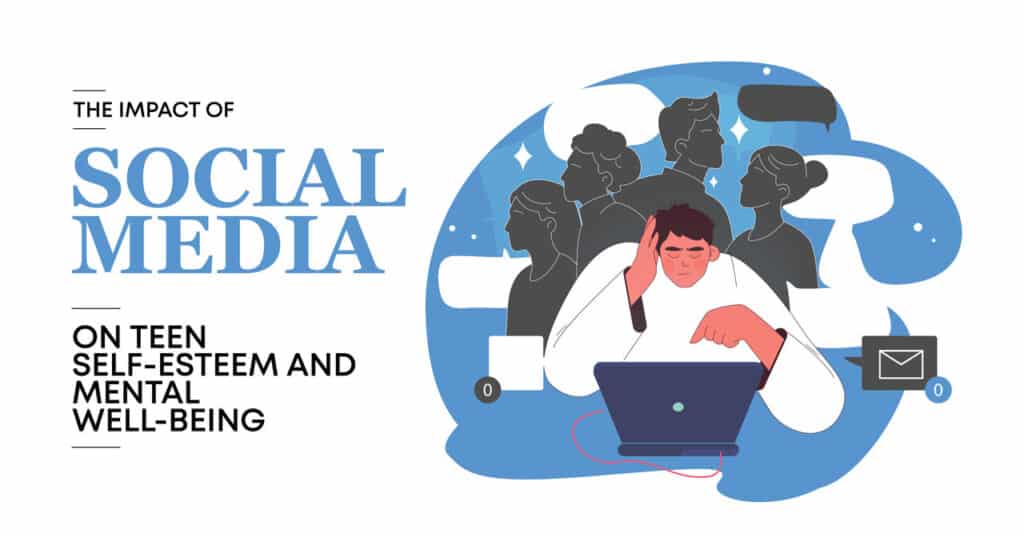Social media platforms have become a significant part of daily life, especially for teenagers. Apps like Instagram, Snapchat, and TikTok dominate their screen time, influencing how they view themselves, their social lives, and the world around them. The relationship between social media use and its effects on teen mental health and self-esteem has been the subject of numerous studies, revealing a complex dynamic.
Essential Takeaways of Self-Esteem
- Mixed Effects on Self-Esteem: Social media can connect and inspire teens, but it also fosters harmful social comparisons and increases the risk of cyberbullying.
- Healthy Habits Matter: Setting boundaries and promoting positive content are essential for preserving mental health and self-esteem.
- Offline Self-Esteem Building: Encouraging real-life activities helps teens develop a more robust self-esteem, rooted beyond the digital world.
This post delves into how social media impacts teens’ self-esteem and mental health, offering practical advice for parents, educators, and teens alike.
What is Teen Self-Esteem?
Self-esteem refers to how we perceive and value ourselves. For teenagers, self-esteem is particularly important as it influences how they handle challenges, relate to others, and make decisions. Adolescence is a time of rapid physical and emotional change, making teens vulnerable to self-esteem fluctuations and feelings of inadequacy.
The Rise of Social Media Among Teenagers
Social media has woven itself into the fabric of teenage life. Most teens spend several hours a day on these platforms, whether posting selfies, watching videos, or chatting with friends. Social media is a space where teens connect, communicate, and express themselves, which can have both positive and negative effects on their self-esteem.
Positive Impacts of Social Media on Teen Self-Esteem
Building Communities and Connections
Social media allows teens to find like-minded peers, building a sense of community and belonging. Positive feedback and interactions on social media can validate their sense of self and boost their confidence.
Platforms for Self-Expression
Social media provides teens with a space for self-expression, allowing them to share their thoughts, creativity, and experiences. Positive responses to this self-expression can enhance their self-esteem.
Access to Support Networks
Many teens find supportive communities on social media that help them cope with mental health struggles. These online spaces can provide validation and a sense of belonging, contributing to healthier self-esteem.
Negative Effects of Social Media on Teen Self-Esteem
The Comparison Trap
Teens are constantly exposed to images of seemingly perfect lives on social media. This can trigger unhealthy comparisons, especially around appearance and lifestyle, leading to feelings of inadequacy and low self-worth.
Cyberbullying and Its Consequences
Social media’s anonymity can embolden bullies, leading to cyberbullying. Victims often experience a drastic drop in self-esteem, which can lead to anxiety, depression, and even suicidal thoughts.
The Pressure to Present a ‘Perfect’ Life
The need to curate a perfect online persona can be exhausting for teens. This pressure can distort reality and erode their healthy self-esteem over time.
The Role of Social Media Algorithms in Shaping Teen Self-Esteem
Amplifying Negative Content
Social media platforms use algorithms that can prioritize harmful content, exposing teens to unrealistic expectations or negative behaviors. This can further damage their self-esteem.
The Echo Chamber Effect
Algorithms often create echo chambers, where teens are surrounded by content that reinforces negative beliefs, making it harder for them to escape feelings of inadequacy or self-doubt.
The Connection Between Social Media Usage and Teen Mental Health
Studies show a strong correlation between social media use and increased rates of anxiety and depression among teens. Constant interactions and the pressure to present a flawless life can significantly affect their mental health and overall well-being.
How Parents and Educators Can Help Teens Navigate Social Media
Encouraging Healthy Social Media Habits
Parents and educators can promote healthy boundaries and guide teens towards positive, uplifting content to help mitigate the negative effects of social media.
Open Communication About Social Media Usage
Having open discussions about social media habits is crucial. Teens should feel comfortable talking about their experiences, especially when encountering negative feedback or harmful influences.
Recognizing the Signs of Social Media-Related Stress
Teens may show signs of distress from social media, such as mood changes, sleep issues, or withdrawal from offline activities. Recognizing these signs can help address the negative impacts before they escalate.
Conclusion
The relationship between social media and teen self-esteem is multifaceted. While social media offers opportunities for connection, self-expression, and support, it also poses significant risks like comparison, cyberbullying, and pressure to maintain a perfect image. By fostering digital literacy, encouraging healthy habits, and promoting open communication, parents, educators, and teens can navigate social media in ways that build self-esteem and mental resilience.
FAQs
- How does social media impact teen self-esteem?
- Social media can boost self-esteem by fostering connections and creativity but can also harm it through unhealthy comparisons and exposure to cyberbullying.
- What are the warning signs that social media is harming a teen’s mental well-being?
- Signs include increased anxiety, depression, sleep issues, withdrawal from offline activities, and obsessive social media use.
- How can parents support their teen’s self-esteem in the age of social media?
- Encourage healthy social media habits, maintain open communication, and promote offline activities that build self-esteem.
- Can social media be used to enhance self-esteem?
- Yes, by following positive accounts, engaging in supportive online communities, and setting boundaries like time limits and regular breaks.
- What should teens do if they face cyberbullying?
- Save evidence, block the bully, and talk to a trusted adult. Reporting the bullying to the platform is also important.





